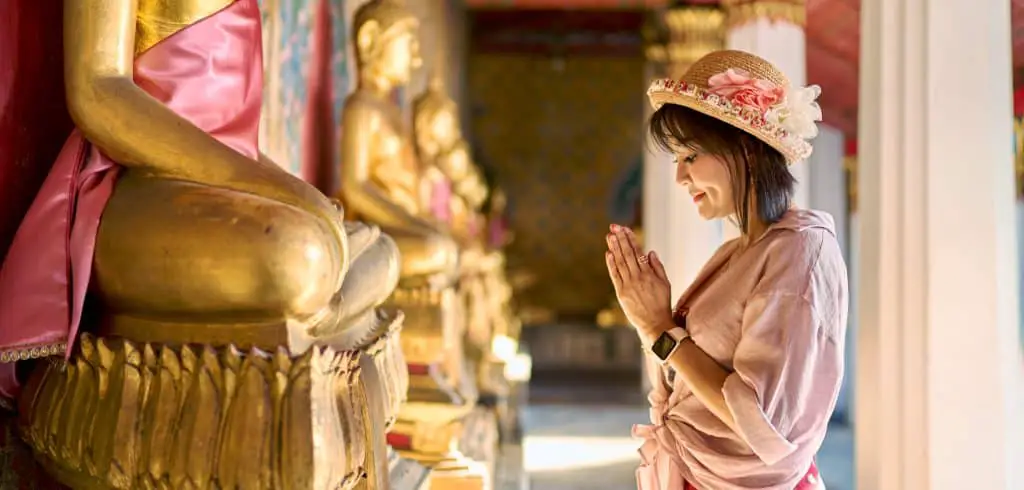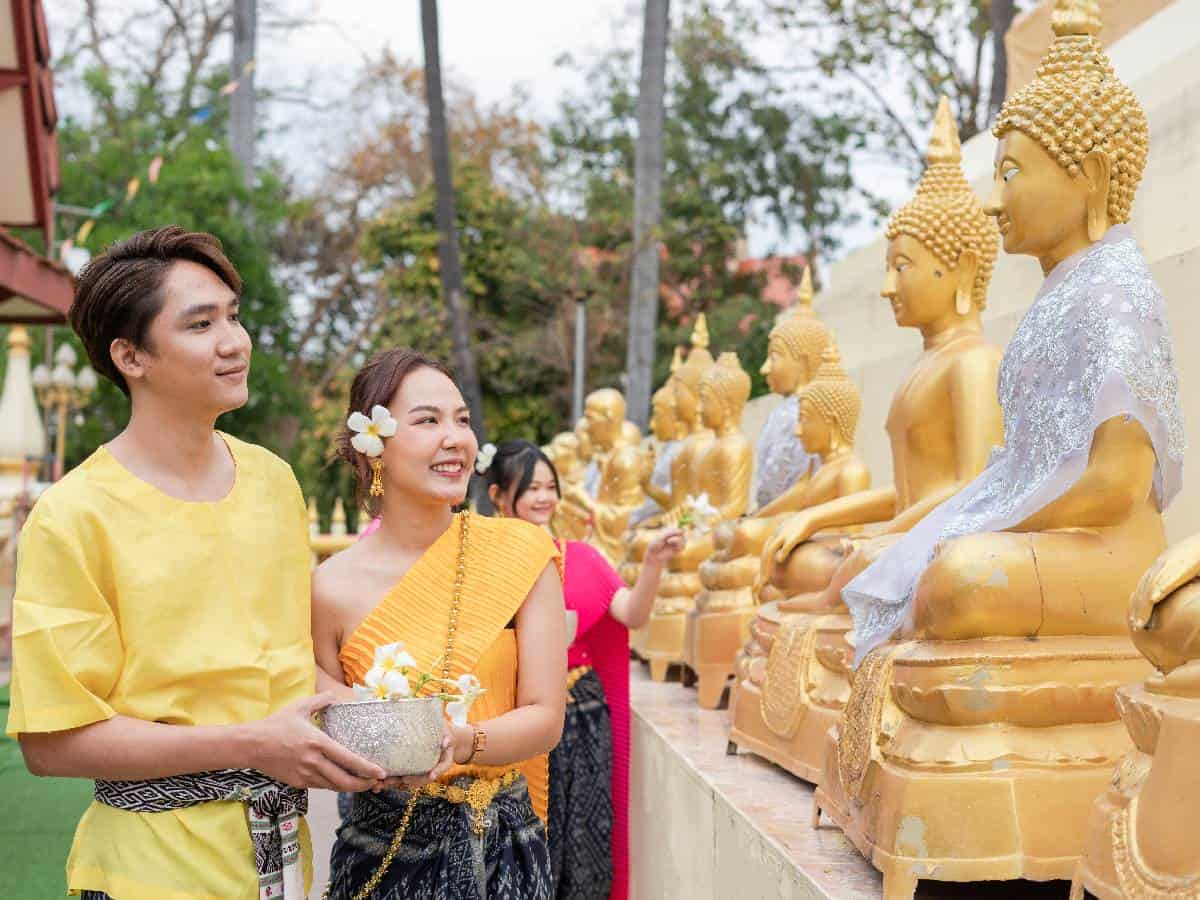Religious Differences in Thai Relationships: A Guide
Living in Thailand has taught me that religion and relationships here go hand in hand in ways that might surprise newcomers. When you first arrive, you quickly realize that navigating religious differences in Thai relationships involves understanding not just personal beliefs, but deeply rooted cultural traditions that have shaped Thai society for centuries. Whether you’re considering a relationship with a Thai partner or already in one, understanding these religious dynamics is crucial for building a strong foundation together.
Key Takeaways
- Thailand’s religious landscape is dominated by Theravada Buddhism (94% of population), with Islam (5.4%) and Christianity (1.2%) as significant minorities, creating unique challenges for mixed-faith couples
- Cultural identity and religious affiliation are deeply intertwined in Thai society, where “to be Thai is to be Buddhist,” making interfaith relationships particularly complex
- Mixed religious couples in Thailand can build successful relationships through mutual respect, open communication, and community support, though they may face social pressures and family resistance
Understanding Thailand’s Religious Landscape

Thailand officially recognizes five religions: Buddhism, Islam, Christianity, Hinduism, and Sikhism, but the reality is more nuanced than these statistics suggest. The majority of Thai people practice Theravada Buddhism, which has profoundly influenced Thai culture, values, and social norms for centuries.
The Dominance of Theravada Buddhism
Theravada Buddhism receives significant government support and has played a major role in shaping Thai culture and society. I’ve observed how Buddhism influences everything from daily interactions to major life decisions among Thai people. Thais are generally respectful of elders and authority figures, placing high value on harmony and non-violence – values rooted in Buddhist teaching.
What many foreigners don’t initially grasp is how Buddhism permeates Thai social life. Buddhist festivals, temple visits, making merit, and respect for monks are integral parts of Thai society. When you’re in a relationship with a Thai Buddhist, you’re not just dating an individual – you’re connecting with a whole cultural framework.
Islam in Thai Society
Islam is the dominant religion in three of the four southernmost provinces (Narathiwat, Yala, and Pattani) near the Malaysian border. The majority of Muslims there are ethnic Malay, but the Muslim population nationwide also includes descendants of immigrants from South Asia, China, Cambodia, and Indonesia, as well as ethnic Thai.
I’ve found that Muslim communities in Thailand maintain strong religious identities while adapting to the broader Buddhist-influenced culture. This creates interesting dynamics for interfaith relationships, particularly in the southern region where Muslim populations are more concentrated.
Christianity and Other Faiths
Christianity was introduced by European missionaries as early as the 1550s and has grown through the work of Thai Christians and foreign missionaries. However, despite nearly 200 years of Protestant missions, only about 1.2 percent of the population are Christians.
Many within the large Thai Chinese population practice various Chinese religions, including Chinese ancestral worship, Taoism, Confucianism and Chinese salvationist religions. These traditions often blend with Buddhist practices, creating a complex spiritual landscape.
Buddhism in Thai Relationships
Buddhist Values in Dating and Marriage
Buddhism teaches that sex should ideally be undertaken within the context of a committed relationship, though Buddhism generally takes the attitude that sex between people who love each other is moral, married or not. This relatively relaxed approach influences how many Thai Buddhists view dating.
In my experience, Thai Buddhist relationships often emphasize mutual respect, harmony, and gradual commitment. The concept of making merit together – whether through temple visits, almsgiving, or participating in Buddhist festivals – often becomes an important bonding activity for Buddhist couples.
Family and Community Expectations
Buddhist families typically expect their children to maintain Buddhist practices and participate in religious ceremonies. When a Thai Buddhist enters a relationship with someone from a different faith, family concerns often center around maintaining religious traditions and ensuring future children will be raised with Buddhist values.
The extended family and community play significant roles in Buddhist relationships. I’ve seen how decisions about marriage often involve input from elders, and community acceptance can significantly impact a relationship’s success.
Christianity and Thai Culture
The Challenge of Cultural Identity
The foremost reason for apparent resistance of Thais toward Christianity is the inseparable intertwining of cultural identity with religious affiliation to Buddhism. To be Thai is to be Buddhist. This creates unique challenges for Thai Christians and their relationships.
Christians are perceived to break family unity by their refusal to participate in the vast ceremonial life that is part of folk Buddhism. I’ve witnessed families struggle when a member converts to Christianity, often feeling that their loved one is rejecting Thai culture itself.
Building Bridges Between Faith and Culture
Some Thai churches work to show their communities that it’s possible to be Thai and a follower of Jesus, bridging the gap between Thai culture and Christianity. Progressive Christian communities in Thailand are finding ways to honor Thai cultural values while maintaining their faith.
For Christian-Buddhist relationships, success often depends on finding creative ways to respect both traditions. This might involve participating in cultural celebrations while maintaining personal religious boundaries, or finding Christian expressions that honor Thai values of respect and harmony.
Navigating Mixed Religious Relationships
Common Challenges
The differences in and intolerance shown toward each other’s beliefs and attitudes are major causes of violence in multicultural families. Research from southern Thailand reveals that religious differences can create significant stress in mixed-faith relationships.
In the southern region, particularly in the three southern border provinces, intercultural marriages mostly occur between Thai Muslim women and Thai Buddhist men. In these cases, the men usually convert to their wives’ religion, Islam, which can lead to significant differences in beliefs and practices.
From my observations, the most common challenges include:
Family Acceptance: Both families may resist the relationship, fearing loss of religious tradition or cultural identity.
Religious Practices: Daily observances, dietary restrictions, and holiday celebrations can become sources of conflict.
Future Children: Decisions about children’s religious upbringing often create significant stress.
Community Pressure: Social acceptance varies greatly depending on location and community attitudes.
Successful Strategies
Despite challenges, many mixed-faith couples in Thailand thrive. Religious differences provide an opportunity for increased respect, understanding, and love when handled with mutual respect and open communication.
Open Communication: Successful couples I’ve met discuss religious differences honestly from early in their relationship. They explore each other’s beliefs without trying to convert their partner.
Respectful Boundaries: Partners establish clear boundaries about religious participation while finding ways to support each other’s spiritual needs.
Family Integration: Gradual introduction of partners to family religious practices, with respect for both traditions, often helps build acceptance over time.
Community Building: Finding supportive communities that accept interfaith relationships provides crucial social support.
Cultural Considerations for Couples
Understanding Thai Religious Syncretism
Most Buddhists incorporate Hindu and animist practices into their worship. This religious flexibility in Buddhism can sometimes make interfaith relationships easier to navigate than in more rigid religious systems.
Many Thai people practice what I call “cultural Buddhism” – participating in Buddhist traditions more for cultural than strictly religious reasons. This can create opportunities for non-Buddhist partners to participate in cultural activities without compromising their own beliefs.
Regional Variations
Religious acceptance varies significantly across Thailand. Bangkok and other urban areas tend to be more accepting of interfaith relationships, while rural areas and the deep south may be more conservative. Understanding your specific community context is crucial.
The Role of Spirituality
Thailand is a Buddhist country with a long history of religious freedom, and this tolerance generally extends to personal relationships. However, spiritual practices often remain important to Thai people regardless of their level of religious observance.
Practical Tips for Success
For Buddhist-Christian Couples
Learn About Each Other’s Faith: Take time to understand the core beliefs and practices of your partner’s religion without judgment.
Find Common Values: Both Buddhism and Christianity emphasize compassion, honesty, and service to others. Focus on shared values rather than differences.
Navigate Festivals Respectfully: Develop strategies for participating in each other’s religious holidays in ways that feel comfortable for both partners.
Consider Professional Guidance: Pre-marital counseling from religious leaders or community elders can help couples better understand each other’s faith and cultural practices.
For Buddhist-Muslim Couples
Understand Conversion Requirements: Where the non-Muslim partner decides to convert to Islam, there is a formal conversion process which involves declaring the Shahada in front of witnesses.
Respect Dietary Laws: Muslim partners maintain halal dietary restrictions, which affects meal planning and social activities.
Plan for Children: The children from the marriage will usually follow one or the other religion, so discuss this important decision early.
Build Community Support: Religious leaders play a crucial role in guiding couples through the legal process and ensuring marriage is conducted according to Islamic principles and Thai law.
Legal Considerations
Marriage Registration: All religious marriages in Thailand must be registered with civil authorities to be legally recognized, regardless of the religious ceremony performed.
Documentation: Ensure all necessary paperwork is completed properly, including any religious conversion documents if applicable.
Children’s Status: Understand how religious differences might affect children’s legal status, inheritance rights, and educational opportunities.
Building Long-term Success
Creating New Traditions
Many successful interfaith couples create their own blend of traditions that honor both backgrounds. This might include celebrating festivals from both religions, creating new family rituals, or finding ways to make merit that accommodate different beliefs.
Maintaining Individual Identity
While compromise is important, maintaining your own spiritual identity is equally crucial. Successful interfaith relationships allow both partners to grow in their own faith while respecting their partner’s journey.
Seeking Support
Don’t underestimate the value of community support. Whether through interfaith dialogue groups, counseling, or supportive family and friends, having people who understand and accept your relationship makes a significant difference.
FAQs
Can a Buddhist and Christian marry in Thailand without either converting?
What happens if a Thai Buddhist converts to Christianity for marriage?
Are there legal requirements for interfaith marriage in Thailand?
How do mixed-faith couples handle children’s religious education?
What support exists for interfaith couples in Thailand?
Conclusion
Religious differences in Thai relationships present both challenges and opportunities for growth. While cultural pressures and family expectations can create stress, I’ve seen many couples build beautiful, lasting relationships by focusing on mutual respect, open communication, and shared values rather than religious divisions.
If you’re considering a move to Thailand or already navigating cross-cultural relationships here, you don’t have to figure it all out alone. At Better Living Asia, we’ve helped countless individuals and couples successfully build their lives in Thailand while honoring their diverse backgrounds. Schedule a consultation with our team to get personalized guidance for your unique situation.






